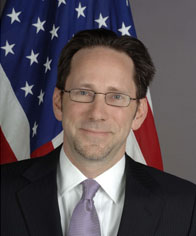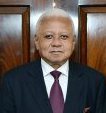Related Research Articles

The International Criminal Tribunal for the former Yugoslavia (ICTY) was a body of the United Nations that was established to prosecute the war crimes that had been committed during the Yugoslav Wars and to try their perpetrators. The tribunal was an ad hoc court located in The Hague, Netherlands.
Universal jurisdiction is a legal principle that allows states or international organizations to claim criminal jurisdiction over an accused person, regardless of where the alleged crime was committed and irrespective of the accused's nationality, country of residence, or any other connection to the prosecuting entity. Crimes prosecuted under universal jurisdiction are considered crimes against all, too serious to tolerate jurisdictional arbitrage. The concept of universal jurisdiction is therefore closely linked to the idea that some international norms are erga omnes, or owed to the entire world community, as well as to the concept of jus cogens—that certain international law obligations are binding on all states.

The International Criminal Tribunal for Rwanda was an international court established in November 1994 by the United Nations Security Council in Resolution 955 in order to adjudicate people charged for the Rwandan genocide and other serious violations of international law in Rwanda, or by Rwandan citizens in nearby states, between 1 January and 31 December 1994. The court eventually convicted 61 individuals and acquitted 14.

Ieng Sary was the co-founder and senior member of the Khmer Rouge and one of the main architects of the Cambodian Genocide. He was a member of the Central Committee of the Communist Party of Kampuchea led by Pol Pot and served in the 1975–79 government of Democratic Kampuchea as foreign minister and deputy prime minister. He was known as "Brother Number Three", as he was third in command after Pol Pot and Nuon Chea. His wife, Ieng Thirith, served in the Khmer Rouge government as social affairs minister. Ieng Sary was arrested in 2007 and was charged with crimes against humanity but died of heart failure before the case against him could be brought to a verdict.

Ieng Thirith was an influential intellectual and politician in the Khmer Rouge, although she was neither a member of the Khmer Rouge Standing Committee nor of the Central Committee. Ieng Thirith was the wife of Ieng Sary, who was Minister of Foreign Affairs of Democratic Kampuchea's Khmer Rouge regime. She served as Minister of Social Affairs from October 1975 until the fall of the Khmer Rouge in 1979.

International criminal law (ICL) is a body of public international law designed to prohibit certain categories of conduct commonly viewed as serious atrocities and to make perpetrators of such conduct criminally accountable for their perpetration. The core crimes under international law are genocide, war crimes, crimes against humanity, and the crime of aggression.

Andrew Thomas Cayley,, is a King's Counsel and was His Majesty's Chief Inspector of the Crown Prosecution Service from 2021 until February 2024. He was appointed by the Attorney General of England and Wales, Suella Braverman MP, KC on 19 January 2021. He is now a Principal Trial Lawyer at the ICC.

The Extraordinary Chambers in the Courts of Cambodia, commonly known as the Cambodia Tribunal or Khmer Rouge Tribunal (សាលាក្ដីខ្មែរក្រហម), was a court established to try the senior leaders and the most responsible members of the Khmer Rouge for alleged violations of international law and serious crimes perpetrated during the Cambodian genocide. Although it was a national court, it was established as part of an agreement between the Royal Government of Cambodia and the United Nations, and its members included both local and foreign judges. It was considered a hybrid court, as the ECCC was created by the government in conjunction with the UN, but remained independent of them, with trials being held in Cambodia using Cambodian and international staff. The Cambodian court invited international participation in order to apply international standards.

Stephen J. Rapp is an American lawyer and the former United States ambassador-at-large for war crimes issues in the Office of Global Criminal Justice.

Joint criminal enterprise (JCE) is a legal doctrine used during war crimes tribunals to allow the prosecution of members of a group for the actions of the group. This doctrine considers each member of an organized group individually responsible for crimes committed by group within the common plan or purpose. It arose through the application of the idea of common purpose and has been applied by the International Criminal Tribunal for the former Yugoslavia (ICTY) to prosecute political and military leaders for mass war crimes, including genocide, committed during the Yugoslav Wars 1991–1999.

John Clint Williamson is an American diplomat, lawyer, and educator who has served in a variety of senior-level roles with the United States Government, the United Nations, and the European Union. He currently serves as the Senior Director for International Justice at Georgetown University, on a joint appointment between the Law Center and the Department of Government. Ambassador Williamson heads the US Department of State-funded project at Georgetown that provides support to the Ukrainian government in its investigation and prosecution of crimes arising from the current conflict. He is the Lead Coordinator of the Atrocity Crimes Advisory Group (ACA), the agreed trans-Atlantic community mechanism for addressing atrocity crimes in Ukraine. In this capacity he coordinates, on behalf of the EU, UK and US governments, the work of the five implementing entities that comprise ACA.
Anees Ahmed is an Indian lawyer. He served as the Chief of Judicial and Legal Affairs, and formerly the Head of Chambers, of the United Nations International Criminal Tribunal for Rwanda.

Brenda J. Hollis is an American lawyer. She was appointed by United Nations Secretary-General Ban Ki-moon as Prosecutor of the Special Court for Sierra Leone in February 2010, replacing Stephen Rapp. Hollis was the Chief Prosecutor at the Special Court and served as the lead prosecutor in the trial and appeal of the case against Charles Taylor, the former President of Liberia. Hollis previously served as the Prosecutor of the Residual Special Court for Sierra Leone, which replaced the Special Court in December 2013; currently James Johnson, an adjunct professor at Case Western Reserve University School of Law, serves as the Chief Prosecutor for the Residual Special Court for Sierra Leone. She also serves as the Reserve International Co-Prosecutor for the Extraordinary Chambers in the Courts of Cambodia, and works as a consultant in international criminal law and procedure.

United Nations Security Council resolution 955, adopted on 8 November 1994, after recalling all resolutions on Rwanda, the Council noted that serious violations of international humanitarian law had taken place in the country and, acting under Chapter VII of the United Nations Charter, established the International Criminal Tribunal for Rwanda (ICTR).

United Nations Security Council resolution 1315, adopted unanimously on 14 August 2000, after expressing concern at serious crimes committed in Sierra Leone, the Council expressed its intention to establish the Special Court for Sierra Leone to deal with violations of human rights, international law and war crimes in the country.
Stuart Robert Glass was a Canadian adventurer and yachtsman killed by the Khmer Rouge in August 1978 while sailing a little yacht named Foxy Lady through Cambodian waters. One of nine "Western" yachtsmen known to have been seized by the Democratic Kampuchean regime between April and November 1978, he was the sole Canadian victim of the 1975–79 Cambodian genocide.

Mohamed Chande Othman is a Tanzanian lawyer and a former Chief Justice of Tanzania.
Prosecution of gender-targeted crimes is the legal proceedings to prosecute crimes such as rape and domestic violence. The earliest documented prosecution of gender-based/targeted crimes is from 1474 when Sir Peter von Hagenbach was convicted for rapes committed by his troops. However, the trial was only successful in indicting Sir von Hagenbach with the charge of rape because the war in which the rapes occurred was "undeclared" and thus the rapes were considered illegal only because of this. Gender-targeted crimes continued to be prosecuted, but it was not until after World War II when an international criminal tribunal – the International Military Tribunal for the Far East – were officers charged for being responsible of the gender-targeted crimes and other crimes against humanity. Despite the various rape charges, the Charter of the Tokyo Tribunal did not make references to rape, and rape was considered as subordinate to other war crimes. This is also the situation for other tribunals that followed, but with the establishments of the International Criminal Tribunal for the former Yugoslavia (ICTY) and the International Criminal Tribunal for Rwanda (ICTR), there was more attention to the prosecution of gender-targeted crimes with each of the statutes explicitly referring to rape and other forms of gender-targeted violence.
The following lists events that happened during 2015 in Cambodia.

Genocide is the intentional destruction of a people in whole or in part. The term was coined in 1944 by Raphael Lemkin. It is defined in Article 2 of the Convention on the Prevention and Punishment of the Crime of Genocide (CPPCG) of 1948 as "any of the following acts committed with intent to destroy, in whole or in part, a national, ethnical, racial, or religious group, as such: killing members of the group; causing serious bodily or mental harm to members of the group; deliberately inflicting on the group's conditions of life, calculated to bring about its physical destruction in whole or in part; imposing measures intended to prevent births within the group; [and] forcibly transferring children of the group to another group."
References
- Dan Southerland, "Khmer Rouge Tribunal - Interview with a Co-prosecutor", Radio Free Asia, 2007-01-24
- Glenn Kauth, "Robert Petit: A divergent path" Archived 2011-11-13 at the Wayback Machine , Canadian Lawyer, July 2009.